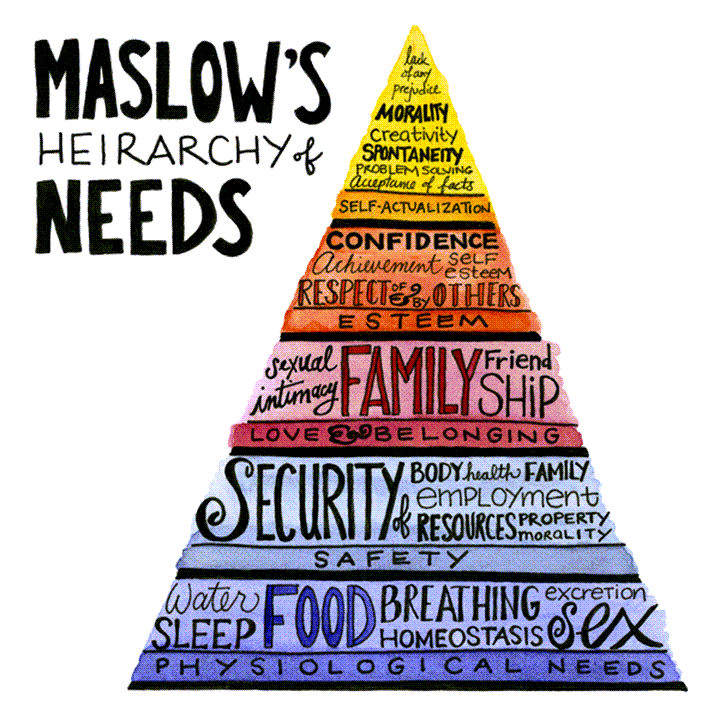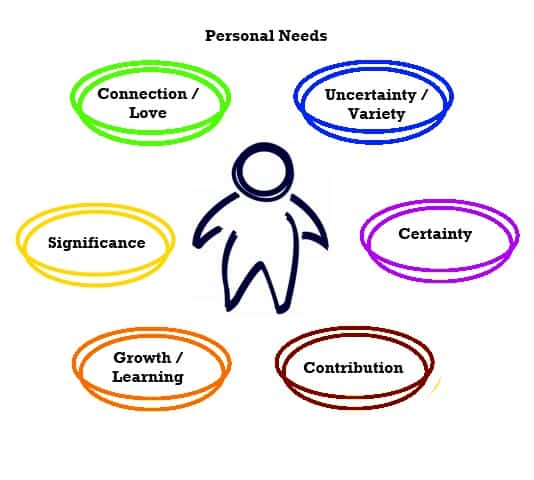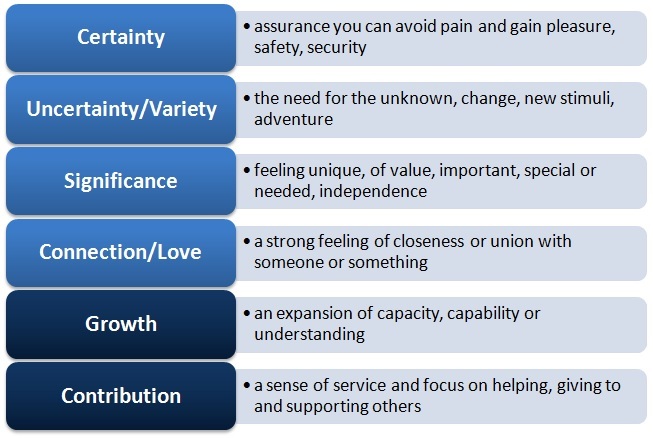When the Need for Contribution is Important to You

Let’s first review Abraham Maslow’s theory of human needs. In 1943, Abraham Maslow proposed the hierarchy of psychological needs, illustrating an order of human motivation.
It is often depicted as a pyramid because Maslow initially suggested that we must satisfy our Physiological Needs first, followed by our need for Safety, Love, and a Sense of Belonging, then Self-Esteem, and finally, Self-actualization in that order.
Maslow later clarified that the order in the hierarchy “is not nearly as rigid” as he originally implied.
For example, for some, the need for Self-Esteem could be more important than the need for Love. For others, the need for creative fulfillment may supersede even the most Basic Needs.

For these reasons, Cloé Madanes, a world-renowned innovator and teacher of family and strategic therapy, separated the Emotional areas from the Physical and reworked the needs into “The Six Human Needs.“
Cloé explains that the Six Human Needs are not “Desires” but actual “Psychological Needs” that we continually try to satisfy consciously and subconsciously.
Your needs influence your deepest motivations and determine how you prioritize your decisions and actions throughout your life.
If you try to meet those needs that are not in line with your values, you will experience conflict and discontent.
Conversely, when you can align your needs with your highest values, you will feel more fulfilled and complete.

The Six Human Needs work in pairs: Certainty with Variety, Significance with Love and Connection, and Growth with Contribution.
The first two pairs are in constant search of balance.
When you feel that you don’t have enough of one of the needs when you have too much of the other.
On the other hand, the bottom two needs, Growth, and Contribution, can grow separately or together.
What is the Need for Contribution?

- Life is incomplete without the sense that one contributes to others or a cause.
- You have to go beyond your own needs and give to others.
- You want to give back and leave a mark on the world.
The need for Contribution means living the Contribution’s purpose and providing value to others that goes well beyond your needs, desires, and wants.
You are primarily living for a higher purpose — for something greater than yourself that can potentially last a lifetime and beyond.
The need for CContributionstems from ouContributionare ourselves, helping others, and adding value to their lives.
It’s about making a difference to individuals, the community, society, and the world.
Of course, this doesn’t mean that all of us will significantly change the world. Instead, it means we work on something that gives life more meaning and purpose.
So, whether your acts of kindness help change one life or many lives does not matter. Instead, it’s the intention behind the work that matters.
To satisfy the need for Contribution, you might contribute time to a cause, a charity, or a community project.
Alternatively, you might fulfill this need by helping someone solve a problem or, maybe, by teaching a class at a local community center.
It doesn’t matter what you do as long as what you do provides you with a sense of fulfillment that you are doing something greater than yourself.
How Contribution Serves You
- Focusing on something beyond yourself makes most of your problems and sources of pain less significant.
- You get Certainty because you know there is always a way to contribute.
- You have variety because there are many different ways of contributing.
- You have Significance because you know you are helping others.
- The spiritual bond that develops by helping others gives you a sense of connection.
- You grow and develop by helping others.
How Contribution Hurts You
- You lose sight of the fact that charity begins at home.
- You care for so many people or for such an important cause that you sometimes neglect taking care of yourself and your loved ones.
- Consequently, your physical, emotional, or spiritual health may suffer.
- You sometimes neglect your relationships, and people can resent the time and energy you put into a cause.
Contribution Focus
- Your focus is on the world, a cause, how to help others, and how to contribute.
Contribution Energy
- You’re energetic and focused outwardly to the point that you can exhaust yourself.
Contribution Health
- You would like to stay healthy, but your need to contribute may drive you to neglect yourself and your health.
Contribution Avoidance
- You avoid being weak, dependent, and powerless.
- You don’t want to lose the respect of those you care about.
Contribution Strengths
- You’re brave, persistent, generous, and assertive.
Contribution Communication Style
- You’re energetic and firm but can be seen as controlling and disregarding others’ opinions.
- Words that you use frequently are ideals, justice, the cause, fairness, compassion, and giving.
Contribution Stress
- You can over-exert yourself and suffer from fatigue.
- Injustice stresses you.
- It’s difficult to restrain yourself from being confrontational in the face of unfairness or injustice.
Contribution Defensiveness
- You become defensive with people who try to control you and those who are deceitful.
- You’re defensive when people are indifferent to essential causes and ideals.
Contribution Emotions
- You’re enthusiastic and outgoing, but you can become angry and aggressive.
The Goal for Achieving Contribution Growth and Balance
Your goal for achieving continuous growth and balance is to find a balance between caring for yourself and your loved ones and contributing to the larger good.
What to do?
- It would be best to notice that you come across as too intense.
- You need to take care of yourself.
- You need to take care of your relationships.
What interferes with your GGoal
- Contribution satisfies your needs at such a high level that you often ignore them and neglect yourself and others.
- Your lifestyle can lead to exhaustion.
- You must always be strong and deny that your vulnerability interferes with your goal.
How can we support the port Goal?
- Others can encourageGoal to take care of yourself and express your vulnerabilities.
- They can stand their ground in expressing what they need from you regarding attention and energy.
Contribution Advice
- It would be best to notice that you can appear too intense.
- You need to take care of yourself.
- You need to take care of your relationships.

